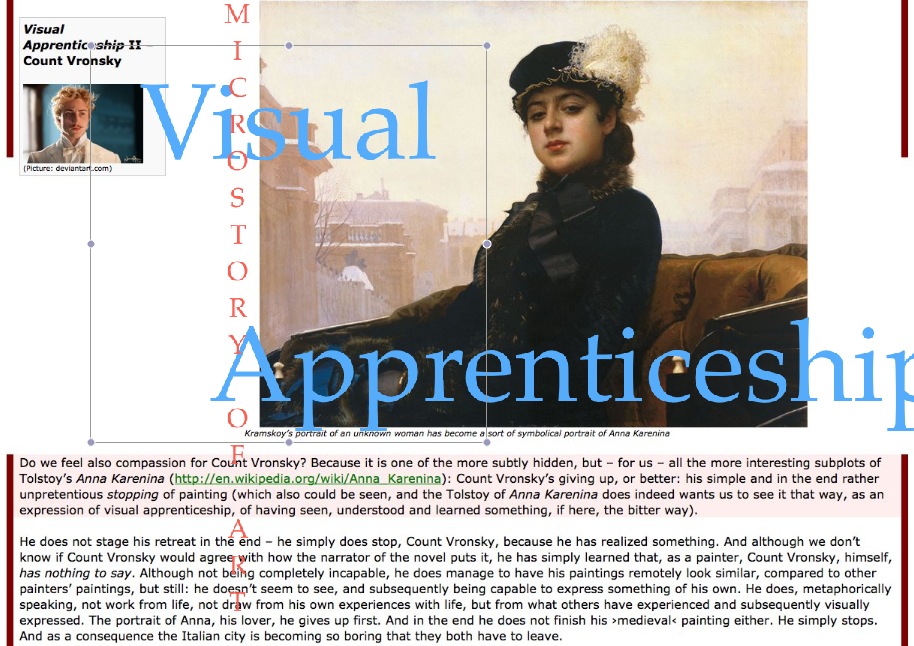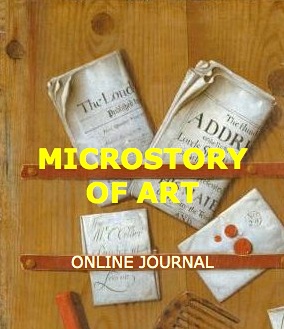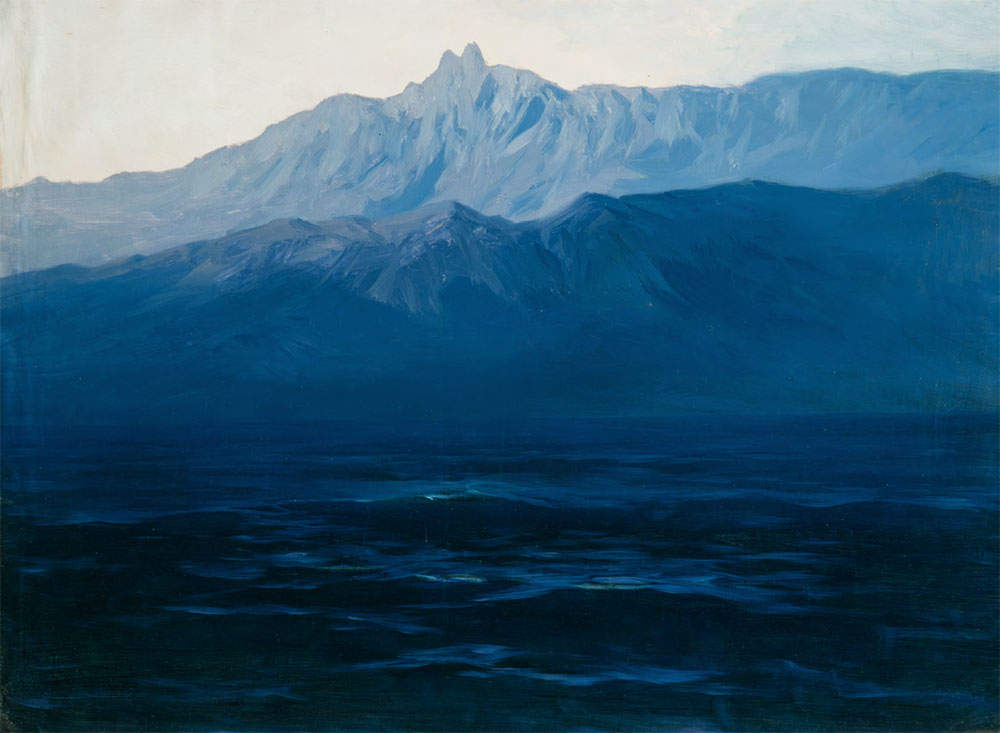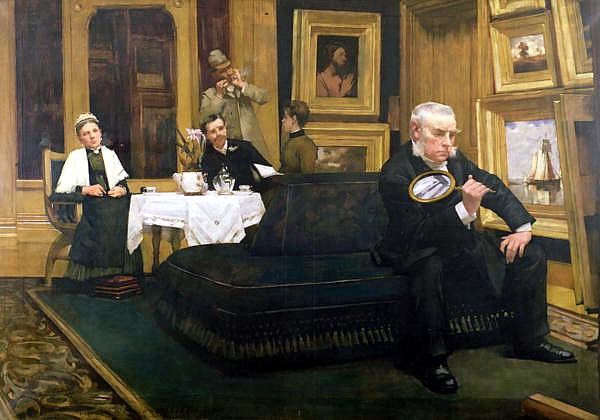M
I
C
R
O
S
T
O
R
Y
O
F
A
R
T
........................................................

NOW COMPLETED:

........................................................
MICROSTORY OF ART
ONLINE JOURNAL FOR ART, CONNOISSEURSHIP
AND CULTURAL JOURNALISM
........................................................
INDEX | PINBOARD | MICROSTORIES |
FEATURES | SPECIAL EDITIONS |
HISTORY AND THEORY OF ATTRIBUTION |
ETHNOGRAPHY OF CONNOISSEURSHIP |
SEARCH

........................................................



 >MICROSTORIES
>MICROSTORIES
- Richard Serra
- Martin Scorsese
- Claude Simon
- Sunshine
- Werner Herzog
- The Creation
- Marcel Duchamp
- Nino Rota
- Wölfflin and Woolf
- Hansjörg Schneider
- Kraftort Arkadien
- Visual Biography
- Schlaraffenleben
- Die Geisteswissenschaften
- The Voyeur
- Buzzword Sustainability
- Paul Verlaine
- Tao Yuanming
- New Beginning
- Seneca
- Still Lifes
- Charles Baudelaire
- Frédéric Chopin
- The Art History of Sustainability
- Wang Wei
- Solarpunk
- Historians of Light
- Lepanto
- Renaturalization
- Plates
- Snow in Provence
- Learning to See
- Picasso Dictionaries
- Peach Blossom Spring
- Picasso Tourism
- Tipping Points
- Sviatoslav Richter
- Weather Reports
- Treasure Hunt
- Another Snowscape in Picasso
- Picasso in 2023
- Dragon Veins
- The Gloomy Day
- The Art of the Pentimento
- Reforestation
- The Status of Painting
- Emergency Supply
- Punctuality
- Watching Traffic
- Zhong Kui
- How Painting Survived the 1990s
- Confirmation Bias
- Sustainability and Luxury
- Garage Bands
- Picasso and Artificial Intelligence
- Eyes of Tomorrow
- Picasso in 2023 2
- Gluing Oneself to Something
- Suburbia
- Bamboo
- Sustainability and Carpe Diem 1
- Interviews with Bruegel
- Sustainability and Carpe Diem 2
- Coffee & Sugar
- Bamboo 2
- Picasso in 2023 3
- Sustainability and Carpe Diem 3
- Cherry Orchard
- Old Magazines
- Chance
- Nick Drake
- Harlequin
- The Smartphone & the Art Book
- Atlas Syndrome
- The Kitchen
- Atlas Syndrome 2
- Consideration
- Tori Amos
- School
- Orchard Auctioning Day
- The Hundred Years’ War
- Sócrates
- Chameleon
- Nefertiti Bust
- Picasso as a Computer
- Sunflowers
- Philemon & Baucis
- Ode to the Radio
- Childhood
- Wimmelbild
- Restitution
- Nick Drake 2
- Wishful Thinking
- Sundays
- The Independent Scholar
- September
- The Fisherman by Pirosmani
- Microadventure
- Sociology
- Salvator Mundi
- Chillon
- Appassionata
- Amber
- Homer
- Berlin
- Planet Walk
- Improvisation
- Seeing Picasso
- These Nice Kids
- Robber
- The One
- The Sea Turtle
- Zoo
- Through the Hush
- Wunderkammer
- I Do Not Seek, I Find
- Shopping Mall
- Food Hamper
- The Secretary
- This Gate
- Nor Rainy Day
- House on a Hill
- Beautiful Island
- Second-hand Bookstore
- Flat
- Slap in the Face
- Serra, Wenkenpark
- Apologies
- The Bells
- Nordmann Fir
- Picasso Wanting To Be Poor
- Picasso, Pirosmani
- A Brief History of Sculpture
- 24 Sunsets
- Rusty Phoenix
- Glove
- Wintry Stanza
- A Song
- Like A Beatle
- Catching An Orange
- Solar Bees
- Permaculture

 >FEATURES
>FEATURES
- Van Gogh On Connoisseurship
- Two Museum’s Men
- Ende Pintrix and the City in Flames
- Titian, Leonardo and the Blue Hour
- The Man with the Golden Helmet: a documentation
- Un Jury d’admission à l’expertise
- Learning to See in Hitler’s Munich
- Leonardo da Vinci and Switzerland
- The Blue Hour Continued
- The Blue Hour in Louis Malle
- Kafka in the Blue Hour
- Blue Matisse
- Blue Hours of Hamburg and LA
- A Brief History of the Cranberry
- The Other Liberale in the House
- The Blue Hour in Raphael
- Who Did Invent the Blue Hour?
- Monet on Sustainability
- Velázquez and Sustainability
- The Blue Hour in Guillaume Apollinaire
- Van Gogh on Sustainability
- The Blue Hour in Marcel Proust
- Picasso and Sustainability
- The Contemporary Blue Hour
- The Blue Hour in 1492
- The Blue Hour in Hopper and Rothko
- Hopper and Sustainability
- The Blue Hour in Ecotopia
- The Hour Blue in Joan Mitchell
- Explaining the Twilight
- The Twilight of Thaw
- The Blue Hour in Pierre Bonnard
- Explaining the Twilight 2
- Picasso on Stalin
- Rubens on Sustainability
- The Salvator Mundi in Bruegel and Rubens
- The Blue Hour in Leonardo da Vinci and Poussin
- The Blue Hour in Rimbaud
- Faking the Dawn
- Frost and Thaw in Ilya Ehrenburg
- Picasso, Stalin, Beria
- Picasso, Solzhenitsyn and the Gulag
- Shostakovich on Picasso
- Hélène Parmelin in 1956
- Historians of Picasso Blue
- Picasso Travelling to Moscow 1
- The Blue Hour in Caravaggio
- Picasso Travelling to Moscow 2
- Picasso, the Knife Game and the Unsettling in Art
- Some Notes on Leonardo da Vinci and Slavery
- Picasso Moving to the Swiss Goldcoast
- The Blue Hour in Camus
- The Blue Hour in Symbolism and Surrealism
- Caspar David Friedrich in His Element
- Exhibiting the Northern Light
- Caspar David Friedrich in His Element 2
- Robert Schumann and the History of the Nocturne
- The Blue Hour in Robert Schumann
- Caspar David Friedrich and Sustainability
- The Twilight of Thaw 2
- Multicultural Twilight
- The Blue Hour in Anton Chekhov
- The Blue Hour in Medieval Art
- Twilight Photography
- The Blue Hour in Bob Dylan
- Iconography of Optimism

 >SPECIAL EDITIONS
>SPECIAL EDITIONS
- Visions of Cosmopolis
- Mona Lisa Landscapes
- Turner and Ruskin at Rheinfelden
- Painters On TV & On TV
- Spazzacamini in Art
- A Last Glance at Le Jardin de Daubigny
- The Experimental Cicerone
- A Dictionary of Imaginary Art Historical Works
- Iconography of Blogging
- Begegnung auf dem Münsterplatz
- Cecom
- Das Projekt Visual Apprenticeship
- Those Who See More
- A Fox on Seeing with the Heart
- Sammlung Werner Weisbach
- Daubigny Revisited
- Some Salvator Mundi Microstories
- Some Salvator Mundi Afterthougths
- Some Salvator Mundi Variations
- Some Salvator Mundi Revisions
- A Salvator Mundi Questionnaire
- A Salvator Mundi Puzzle
- Unknown Melzi
- Francis I and the Crown of Charlemagne
- From Amboise to Fontainebleau
- Drones Above Chambord
- Looking Back At Conques
- Flaubert At Fontainebleau
- Images of Imperial Ideology
- The Chronicles of Santa Maria delle Grazie
- Seeing Right Through Someone
- Melzi the Secretary
- Eying Glass
- A Foil to the Mona Lisa
- A Renaissance of the Cartoon
- Sketching a Family Tree
- Venetian Variations
- A Brief History of Digital Restoring
- A Consortium of Painters
- Leonardeschi and Landscape
- A Christ in Profile
- Learning to See in Spanish Milan
- A History of Gestures
- Leonardo and Josquin
- A Renaissance of the Hybrid
- Suida and Heydenreich
- The Watershed
- Three Veils
- From Beginning to End
- Connoisseurship of AI
- Twilight and Enlightenment
- The Blue Hour in Chinese Painting
- Dusk and Dawn at La Californie
- Iconography of Sustainability
- The Blue Hour in Goethe and Stendhal
- The Sky in Verlaine
- The Blue Hour in Paul Klee
- Iconography of Sustainability 2
- The Blue Hour in Charles Baudelaire
- From Bruegel to Solarpunk
- Some Salvator Mundi Documentaries
- Some More Salvator Mundi Monkey Business
- The Windsor Sleeve
- Brigitte Bardot’s Encounter with Picasso
- Art Historians and Historians
- A Salvator Mundi Chronicle
- The Salvator Mundi and the French Revolution
- The Fontainebleau Group
- The Encounter of Harry Truman with Pablo Picasso
- The Fontainebleau Group Continued
- The Windsor Sleeve Continued
- The Salvator Mundi in Early Netherlandish Painting 1
- Some Salvator Mundi Resources
- A New Salvator Mundi Questionnaire
- The Woman in Picasso
- The Yarborough Group
- Melzi, Figino and the Mona Lisa
- The Yarborough Group Continued
- A Salvator Mundi Global History
- The Salvator Mundi in Medieval Art
- The Salvator Mundi in Medieval Art 2
- The Salvator Mundi in Early Netherlandish Painting 2


 >HISTORY AND THEORY OF ATTRIBUTION
>HISTORY AND THEORY OF ATTRIBUTION
- The Mysterious »Donna Laura Minghetti-Leonardo«
- Assorted Demons of Connoisseurship
- Panofsky Meets Morelli
- Discovering the Eye of Sherlock Holmes
- Handling the Left-handed Hatchings Argument
- Visual History of Connoisseurship
- Alexander Perrig
- Connoisseurship in 2666
- What Postmodernity Has Done to Connoisseurship
- Dividing Four Fab Hands
- A Leonardesque Ambassador
- Test Cases in Connoisseurship
- A Raphael Expertise
- How to Tell Titian from Giorgione
- Louise Richter
- The Unique Property in the History of Connoisseurship
- An Expertise by Berenson
- The Book of Expertises
- An Album of Expertises
- An Expertise by Friedländer
- A Salvator Mundi Provenance
- How to Tell Leonardo from Luini
- An Expertise by Crowe and Cavalcaselle
- An Expertise by Bayersdorfer
- An Expertise by Hermann Voss
- An Expertise by Hofstede de Groot
- Leonardeschi Gold Rush
- An Unknown »Vermeer«
- An Expertise by Roberto Longhi
- An Expertise by Federico Zeri
- A Salvator Mundi Geography
- A Salvator Mundi Atlas
- The Bias of Superficiality
- 32 Ways of Looking at a Puzzle
- James Cahill versus Zhang Daqian
- Five Fallacies in Attribution
- On Why Art History Cannot Be Outsourced to Art Dealers
- On Why Artificial Intelligence Has No Place in Connoisseurship
- Salvator Mundi Scholarship in 2016
- Leonardo da Vinci at the Courts
- The Story of the Lost Axe
- The Last Bruegel
- A Titian Questionnaire
- On Where and Why the Salvator Mundi Authentication Did Fail
- The Problem of Deattribution

 >ETHNOGRAPHY OF CONNOISSEURSHIP
>ETHNOGRAPHY OF CONNOISSEURSHIP
MICROSTORY OF ART
ONLINE JOURNAL FOR ART, CONNOISSEURSHIP
AND CULTURAL JOURNALISM
........................................................

***
ARCHIVE AND FURTHER PROJECTS

1) PRINT


***
2) E-PRODUCTIONS


........................................................

........................................................

........................................................
FORTHCOMING:


***
3) VARIA

........................................................

........................................................

........................................................

........................................................

........................................................
***
THE GIOVANNI MORELLI MONOGRAPH

- The Giovanni Morelli Monograph
........................................................
MICROSTORY OF ART
ONLINE JOURNAL FOR ART, CONNOISSEURSHIP AND CULTURAL JOURNALISM
HOME
MICROSTORY OF ART
MICROSTORY OF ART
ONLINE JOURNAL FOR ART, CONNOISSEURSHIP AND CULTURAL JOURNALISM

Dedicated to the Study of History

The Hundred Years’ War
(23.8.2023) The study of history? Is it worth it? Tough question, you might say, and further ask: who’s asking anyway? Answer: It’s me, I am asking (myself), if the study of history was worth it. I am asking retrospectively, which means: I am asking as a historian (of myself), if the study of history was worth it. So the answer can probably not be a simple ›no‹, because otherwise I would not be asking as a historian (of myself), if the study of history was worth it. But the answer might not be a simple ›yes‹ either. If academic historians declare that the humantities (read: them, respectively: their jobs) are important anyway, don’t trust them without further questions. My answer is not a clear yes, nor a clear no. It is not that simple, and the study of history might not be something for everyone, nor might it be something (as in my case) that someone (me) is ready and willing to do his whole life (for example in the role of an academic historian). So be it. It is not that simple. And now we can start to look back on how my study of history began: with an undergraduate seminary on the Hundred Years’ War. Which I am using as my prism, to ask the question in various ways now. Is the study of history worth it, and if yes, why?

(Picture: DS: Mad King Statue)
1) The Mad King
If I am doing a series of paintings on the motif of the ›Mad King‹ (Charles VI of France), I feel to be in touch with my own history, which encompasses a study of history, as well as, and as a part of that, an undergraduate seminary in which I probably heard of the Mad King for the very first time. The motif of the Mad King does still inspire me, so that I have put here (on the left) a version which is called Mad King Statue (and above a historical miniature showing this very motif). What is my painting about? Answer: It shows the mad king as a statue, placed at the entrance to a forest, in which all kind of objects are placed, meant to trigger scenes of madness, to be displayed by the king, so that other political figures may find justification to take over power, and to dethrone the king due to his madness (as having been displayed in the forest, or on other occasions).
To work with such motif, of course, a study of history is not necessary, and not even history might be necessary. But in case one would work with such motif, due to having found it in fictional literature, such literature would probably have links to historical literature, and as such be in need in history, the knightly culture of the 14th and 15th century, to inspire such motifs.
I have begun my study of history with an undergraduate seminary on the Hundred Years’ War, but also with undergraduate seminaries on the Swiss Peasant War, as well as on the history of the Cold War. The end of the Cold War years I have lived through myself, and the Swiss Peasant War is part of the history of Switzerland, the country in which I have spent much of my own life. But nothing, I must stress, nothing does actually link my own personal history with the history of the Hundred Years’ War. At least not obviously. So actually, it might have been an odd choice to study this endless series of calamities, which the Hundred Years’ War is a name for. But no, actually not so odd a choice, since the function of this undergraduate seminary was to introduce students to the study of history, no matter, actually, the subject. And it makes a difference if you look at the topic remotely, or if you feel to be a part of the story (its aftermath, and, perhaps, do identify with one side in this particular war, or even with various sides).
The Hundred Years’ War is not that easy to sum up. The endless series of calamities starts with a game of chess between Westminster and the Louvre, one might say, to make things easier (the English king did decline further to be a loyal vessel of the French king, and he declared to be the legitimite king of France as well). And perhaps the layman is willing to follow the summary up to the plague interrupting the war. Which, however, does continue, and never seems to end. And part of the experience to study the Hundred Years’ War might be the experience to feel lost in chaos and dissolution of any existing order, which, as you will notice somewhat later, is actually quite a good summary of what the Hundred Years’ War was about, at least for many people experiencing it.
Did the Hundred Years’ War take place at all? I must say that, during an undergraduated seminary, you will not get original historical documents on your table usually, but I got some, since, as a student of history, I did work for some time, if somewhat later, for a trader of autographs on the other side of the street (in which the seminary did take place), and I definitely got documents from the Hundred Years’ War on my desk, which again, must have raised the question how to to be certain that events that you read about, or structures, really did have an existence in history. If, as it is often the case, as a historian, you do study the work of other, and very often of other very naive historians rather than the past itself.
2) On Jeanne d’Arc and On How She Was Possible
Barbara Tuchman who, with The Distant Mirror, did write a still immensely popular and readable book on the calamities of the 14th century, did write on large parts of the Hundred Years’ War, but not a history of the Hundred Years’ War as such. One might still discuss today if it really was a good idea to reflect about the parallels of the 14th and the 20th century at all, but the point is here: in her influential narrative the Hundred Years’ War goes on to a certain point, but the books ends without Tuchman having told us about the role of Jeanne d’Arc in the same detail as she, for example, does cover the plague.
The role of Jeanne d’Arc might be a minor role in English historiographical literature on the Hundred Years’ War (at least I do know a summary of the Hundred Years’ War, in which she figures hardly at all), but Jeanne d’Arc, for many a French historian, might be a reason to study this war, or even to become an expert for this very topic.
I, myself, am still interested in the figure and the role of Jeanne d’Arc, but more in terms of asking how her role, and how her influence was actually possible. And it may come as a surprise to many a layman reader of history that, actually, we do know quite a lot about how exactly Jeanne d’Arc could become a sort of ›activist‹ and ›influencer‹ in the context of the Hundred Years’ War. We know, for example, about the role of certain family members who promoted her, we know of the history of mentalities (that took prophecies quite seriously, and, as such, could be inclined to await them), and so on. We even know her journey from periphery to centre of events quite well, and it is worth studying the role Jeanne d’Arc had, as well as the role various historiographies do give her (in the context of particular narratives). The study of biography, political biography, this might also be a lesson from an undergraduate seminary, is hence not to be underestimated, but one should stay aware of structures that make political figures possible, too.
3) The Dangers of Looking Back
There are situations in life in which it is not particularly helpful to look back methodically. This is when real problems have to be managed immediately. But even then a brief look into the prestory of a particular situation is often necessary – to understand the situation as well as to realize that it might be dangerous – now – to speak about the past in too much detail.
In such situations one does realize that it is helpful to have available all the skills that a study of history might help you to develop, but including a sense that historical knowledge – detailed knowledge – cannot be discussed in every situation, and practical skills as well as a knowledge of people (for which the study of history might be helpful, too, but not actually a necessary precondition) might be required much more, as, perhaps, is also theoretical knowledge of, for example, how a particular situation works and how a problem can be solved, or a crisis can be managed.
Thus we know from our own lives that historical knowledge is not the one key in life (but one useful resource), and the study of history is not the one path to wisdom and certainly not a path to practical knowledge. History (in terms of knowledge) can be useful in life and in many situations, but it is not important per se and in every situation, respectively always, even if academic historians may state that history is important per se. In principle yes, but the skills to be able to study history can be acquired quite easily, and one has to decide individually, regarding particular situations, if looking back is useful or not. And if you decide to become a historian for lifetime, one should keep in mind that you specialize in one dimension of reality and are prepared – more than others – to highlight that dimension of reality, which is not the only dimension of reality, although the past may encompass everything so that, if you want to acquire the broadest knowledge possible, the study of history might be the right things for you. But it is still possible that a good portion of historical knowledge – that goes along with other dimensions of knowledge and other skills – is the better solution. But this is an individual choice, and I have decided that this later choice is the one for me. So, a study of history is allright – but I am decided to make something of it rather than to remain to be a historian for all my life.
MICROSTORY OF ART
ONLINE JOURNAL FOR ART, CONNOISSEURSHIP AND CULTURAL JOURNALISM
HOME
© DS
